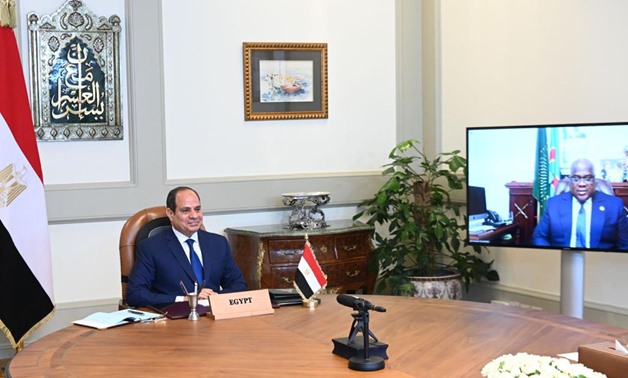
Egypt prisedent Abdel Fatah al SISI during a virtual mini-summit grouping member states of the Bureau of the African Union Heads of State and Government to discuss the GERD file - Press Photo
CAIRO – 27 June 2020: Egypt, Sudan and Ethiopia agreed, Thursday on forming an African Union-sponsored committee grouping legal and technical experts from the three countries to draft a final binding deal on the Grand Ethiopian Renaissance Dam (GERD) and avoid any unilateral action including the dam's filling before finalizing an agreement.
During a virtual mini-summit grouping member states of the Bureau of the African Union Heads of State and Government to discuss the GERD file, President Abdel Fatah al-Sisi said that Egypt is ready to resume negotiations with Sudan and Ethiopia to reach a fair and balanced agreement on filling and operating GERD.
To ensure successful negotiations, all parties shall pledge not to make any unilateral decisions, as well as halt the dam's filling till reaching an agreement preserving the three countries' interests, Sisi said.
Sisi thanked South African President Cyril Ramaphosa for his call to hold such an important summit to address the vital GERD issue that directly affects the lives of millions in Egypt, Sudan, and Ethiopia, Presidential Spokesman Bassam Rady said in a statement.

The president asserted that Egypt aims to reach a fair and balanced agreement that preserves Ethiopia's right to achieve economic development and capability to generate the needed electricity, taking into account the interests of the downstream countries (Egypt and Sudan) and their water rights.
Earlier, Thursday, Sisi received a phone call from South African President Cyril Ramaphosa, the head of the African Union in 2020, discussing the issue of the controversial Grand Ethiopian Renaissance Dam (GERD), announced Egyptian Presidential Spokesperson Bassam Radi in a statement.
The phone call between the two leaders tackled Egypt's request to the UN Security Council to intervene in the issue of the dam to reach a fair and balanced agreement that takes into account the interests of all parties, Radi said.
President Sisi affirmed Egypt’s rejection of unilateral steps [by Ethiopia] that would harm Egypt's rights to the Nile waters, Radi continued.
The South African President expressed his aspiration to intensify coordination between the two countries during the coming period, added Radi, noting that Ramaphosa praised the sincere and constructive political will that Egypt has always shown to reach a solution to the dam crisis.
On Wednesday, Sudanese Prime Minister Abdullah Hamdouk and South African President Cyril Ramaphosa discussed the ways of resumption of the tripartite negotiations between Egypt, Sudan and Ethiopia over the dam.
They agreed on urging Egypt and Ethiopia to return to the negotiating table as soon as possible, the statement added.
Since 2014, Egypt, Ethiopia, and Sudan have entered into negotiations of the building of the dam to avoid any possible threats on the Nile downstream countries [Egypt and Sudan]. The latest round of the talks which convened early June reached a stalemate, ahead of the Ethiopian unilateral act of filling the dam’s reservoir mid July without reaching a final agreement among the three countries.
Egypt last week decided to request the United Nations Security Council’s intervention in the dispute on Ethiopia’s massive dam, after Egypt said several times that the two countries have been deadlocked over the dam.
By referring the issue to the Security Council, in accordance with articles 34 and 35 of the United Nations Charter, Egypt requests the council to undertake its responsibilities in preserving international peace and security and pressurize Ethiopia into committing itself to the international law on international watercourses and refraining from filling the dam’s reservoir before a tripartite agreement is reached.
Egypt’s President Abdel Fattah El Sisi on Wednesday urged the government to currently abide by the diplomatic path of negotiations, in an effort to solve the GERD crisis, the Presidency said.

Egyptian Ministry of Water Resources and IRrigation Mohamed Abdel-Atti said in a statement that Ethiopia also sought to obtain an absolute right to establish projects on the upper reaches of the Blue Nile River. It also refrained from agreeing on including a binding legal mechanism to settle disputes and effective procedures to face drought in the GERD agreement, he added.
The difference between Egypt, Sudan, and Ethiopia dates back to May 2011 when Ethiopia started building the dam; Egypt voiced concern over its water share [55.5 billion cubic meters]. Three years later, a series of tripartite talks between the two countries along with Sudan began to reach an agreement while Ethiopia continued the dam construction.
In 2015, the three countries signed the Declaration of Principles, per which the downstream countries should not be negatively affected by the construction of the dam. Since then, the talks have been resumed, but In October 2019 blamed Addis Ababa for hindering a final agreement concerning a technical problem, calling for activating the Article No. 10 of the Declaration of Principles, which stipulates that if the three countries could not find a solution to these differences, they have to ask for mediation.





Comments
Leave a Comment